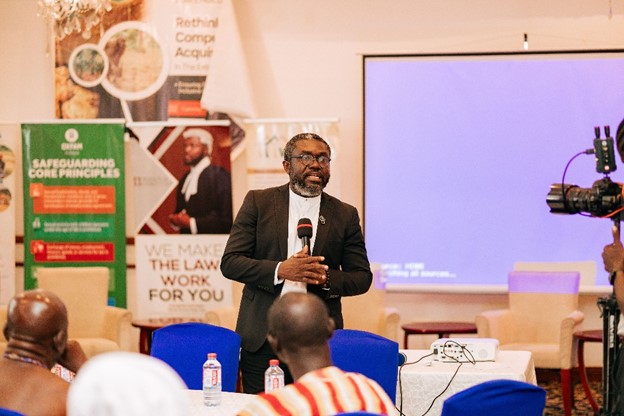Beyond Compensation: Rethinking Land Rights and Consent in Ghana’s Extractive Sector

These are the hard questions that emerged at a national forum recently convened by A Rocha Ghana, Oxfam in Ghana, Wacam, Merton and Everett LLP and the Centre for Public Interest Law (CEPIL). Merton & Everett LLP was privileged to engage in this powerful space of inquiry and advocacy, where the focus was squarely on two pillars of equitable natural resource governance: compulsory land acquisition and Free, Prior, and Informed Consent (FPIC).
The Legal Framework: Strong on Paper, Fragile in Practice
Ghana’s Constitution guarantees the right to property and allows compulsory acquisition only for public purposes with fair compensation. The Minerals and Mining Act (2006) and Lands Act (2020) provide additional regulatory backing. But case studies discussed at the forum; most notably the Newmont Ahafo North Project and the Petroleum Hub Project – highlighted a troubling pattern:
- Compulsory acquisitions executed with little to no community consultation
- Compensation models that devalue farming and ancestral ties to land
- Regulatory loopholes that favor corporate interests over local rights
Legal protections exist—but they are undermined by weak enforcement, political overreach, and systemic opacity.
FPIC: From International Principle to National Necessity
FPIC: Free, Prior, and Informed Consent was framed as a non-negotiable right. Speakers stressed that communities must have the power to say yes or no to developments that reshape their land, environment, and livelihoods. While FPIC is enshrined in various international frameworks, Ghana has yet to formally codify it into domestic law.
Participants were reminded that consent is not consultation after decisions have already been made. It’s a process of dialogue, respect, and agency.
Real Stories, Real Struggles
Testimonies from affected community members grounded the forum in lived reality:
- A resident of Tano North recounted how military forces were deployed without notice, silencing community resistance.
- Engineer Kojo Ndede, Chairperson of the Coalition of concerned Nzema citizens revealed that the Petroleum Hub’s proposed 20,500-acre footprint could be cut by two-thirds, preserving land, livelihoods and life.
From the floor, one theme was constant: the process is broken, and people are paying the price.
A Roadmap for Reform: What Needs to Change
The forum did not just diagnose the problem, it outlined a path forward:
1. Legislate FPIC
Ghana must embed FPIC into its legal framework, especially the Minerals and Mining Act and Lands Act. This includes clear definitions, enforcement mechanisms, and legal remedies for violations.
2. Rethink Compensation
Compensation must go beyond market value. It must account for spiritual, cultural, environmental, and social losses; from sacred sites to soil fertility and community cohesion.
3. Invest in Legal Education
Empowering communities starts with knowledge. Civic education tools, pocketbooks, paralegal training, legal clinics can help citizens understand their rights and resist unjust acquisitions.
4. Build Community-CSO Partnerships
Credible civil society groups bring critical legal and advocacy expertise. These partnerships must respect community agency and amplify grassroots voices in national policymaking.
Conclusion: Justice in the Soil
At Merton & Everett LLP, we believe that justice is not abstract, it is rooted in the soil, in livelihoods, in legacy. Land is more than terrain; it is identity, memory, and power.
The extractive sector continues to be a paradox: generating national revenue while entrenching local poverty and displacement. But it does not have to be this way. Through inclusive laws, meaningful consent, and accountable leadership, Ghana can turn the tide, from exploitation to equity.
Now is the time to listen, legislate, and lead. Anything less would be another form of extraction – this time, of dignity.
